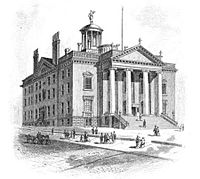43rd New York State Legislature
| 43rd New York State Legislature | |||||
|---|---|---|---|---|---|
|
|||||

The Old State Capitol (1879)
|
|||||
| Overview | |||||
| Jurisdiction | New York, United States | ||||
| Term | July 1, 1819 – June 30, 1820 | ||||
| Senate | |||||
| Members | 32 | ||||
| President | Lt. Gov. John Tayler (Dem.-Rep.) | ||||
| Party control | Bucktail | ||||
| Assembly | |||||
| Members | 126 | ||||
| Speaker | John C. Spencer (Clint.) | ||||
| Party control | Clintonian-Federalist | ||||
| Sessions | |||||
|
|||||
| 1st | January 4 – April 14, 1820 |
|---|
The 43rd New York State Legislature, consisting of the New York State Senate and the New York State Assembly, met from January 4 to April 14, 1820, during the third year of DeWitt Clinton's governorship, in Albany.
Under the provisions of the New York Constitution of 1777, amended by the Constitutional Convention of 1801, 32 Senators were elected on general tickets in the four senatorial districts for four-year terms. They were divided into four classes, and every year eight Senate seats came up for election. Assemblymen were elected countywide on general tickets to a one-year term, the whole Assembly being renewed annually.
In 1797, Albany was declared the State capital, and all subsequent Legislatures have met there since. In 1818, the Legislature enacted that future Legislatures meet on the first Tuesday of January of each year unless called earlier by the governor.
State Senator Darius Crosby died on November 18, 1818, leaving a vacancy in the Southern District.
At this time the politicians were divided into two opposing political parties: the Federalists and the Democratic-Republicans. The Democratic-Republican Party was split into two factions: the Clintonians (supporters of Gov. DeWitt Clinton) and the Bucktails (led by Martin Van Buren, and including the Tammany Hall organization in New York City).
The State election was held from April 27 to 29, 1819. The Federalists ran their own tickets in counties where they had a majority, but endorsed and supported the Clintonians in most places where they were a minority.
Senator Peter R. Livingston (Southern D.) was re-elected. Charles E. Dudley, John T. More (both Middle D.), Benjamin Mooers, Thomas Frothingham (both Eastern D.), Gideon Granger, Lyman Paine (both Western D.), and Assemblyman Duncan McMartin Jr. (Eastern D.) were also elected to full terms in the Senate. John Townsend (Southern D.) was elected to fill the vacancy. Livingston, Dudley, More and Townsend were Bucktails, the other five Clintonians.
...
Wikipedia
